Brian Clegg's Blog, page 146
March 23, 2012
Newspapers and science
 Among the mystery guests in our bodies
Among the mystery guests in our bodiescovered in the articleI've got a piece I wrote on a science subject in one of the national newspapers on Sunday. It might be a little surprising to learn that it's in the Mail on Sunday.
I'll be honest, the Daily Mail and the Mail on Sunday aren't the newspapers that spring to mind immediately when it comes to science. The Mail has a reputation for having a constant programme of announcing that different foods and drinks either cause or prevent cancer (or both). But I have to say that with newspapers, the reality is often quite different from the caricature.
I'm reminded of many moons ago when I attended the Microsoft Windows 95 launch. (As an aside, I got the best giveaway I've ever had a product launch - a Windows 95 shoulder bag that I'm still using today.) It was at a venue in Leicester Square and the audience were all sitting round tables for a meal before the event proper. I was sitting next to the Sun's business editor. We all, I suspect, have an image of people who work for a red top like the Sun. Brash, Jack-the-lad types. Kelvin Mackenzie and Piers Morgan clones. In fact, said business editor was urbane, clever and personable. And rather shy.
Similarly, my experience with the Mail on Sunday has been very positive. They ran a superb review of my Inflight Science written by Alain de Botton last year - and this piece I've just done for them has been a delight to write. What's more, there was no attempt to dumb it down - it fact they asked me to put more science in it than my first draft had.
So if you want to see what I'd modestly have to say is a rather interesting piece about the various invaders in our body that help us rather than cause us problems (a non-trivial number of them when you consider we have ten times as many non-human cells in our bodies than we have human cells), take a look at the Mail on Sunday this weekend (25 March 2012).
Image from Wikipedia
Published on March 23, 2012 08:13
March 22, 2012
Save NASA's robots
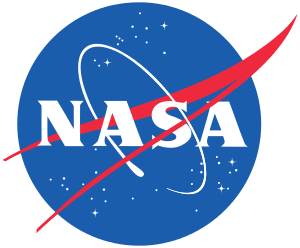 I gather from the Beeb that 'swingeing cuts' have been proposed to NASA's robotic exploration budget. It seems that there is going to be a change in priorities away from unmanned explorers as 'The FY2013 budget proposal shifts funds to human spaceflight and space technology...' This is madness.
I gather from the Beeb that 'swingeing cuts' have been proposed to NASA's robotic exploration budget. It seems that there is going to be a change in priorities away from unmanned explorers as 'The FY2013 budget proposal shifts funds to human spaceflight and space technology...' This is madness.If you think of what NASA has achieved over the years, we get far more value from its satellites and robotic missions than from human spaceflight. Manned exploration is primarily a political showcase. Of course there are always things a human being can do better - but when you weigh up the risk in human lives and the vastly increased cost to support human beings against all the benefits that we've had from satellites and probes it's a no-brainer.
If they really want to seriously trim NASA's budget - and science needs to accept that it can't be exempt, even though I would argue that R and D, science and creativity are things you really don't cut in a recession if you want to get out of it - then they should discard all spending on human spaceflight and focus on the stuff that really delivers. It's time space science stopped being a way of showing off who as the biggest willie and started being a truly scientific venture that has a proper grasp of costs and benefits.
Image from Wikipedia
Published on March 22, 2012 09:21
March 21, 2012
The tax morality dilemma
 It's all about the money (money, money)It's budget day in the UK and there is much headscratching about taxation and its avoidance. There was a fascinating discussion about the morality of tax avoidance on yesterday's Channel 4 News between representatives of a conservative think tank and UK Uncut which calls itself 'a grassroots movement taking action to highlight alternatives to the government's spending cuts'.
It's all about the money (money, money)It's budget day in the UK and there is much headscratching about taxation and its avoidance. There was a fascinating discussion about the morality of tax avoidance on yesterday's Channel 4 News between representatives of a conservative think tank and UK Uncut which calls itself 'a grassroots movement taking action to highlight alternatives to the government's spending cuts'.Tax avoidance is one of those things that it's so easy to have a knee-jerk reaction to - 'We need to clamp down on it!' - but when you start looking at it in detail, it's not all black and white. Tax avoidance is about keeping your personal tax burden to a minimum - realistically, who wants to pay more tax than they legally have to?
At its most morally friendly, tax avoidance is putting your savings in a tax-free ISA. That way you avoid paying the tax on the interest you would otherwise pay. Few would argue this is a problem. Then there's the middle ground. So, for instance, anyone who owns their own company will have some leeway on deciding whether the individual or the company pays tax on various items. For example, the individual could buy a computer and pay the tax on it, or the company could buy it and not pay the tax. If it's for business use, most people would argue it's morally okay to avoid the tax - yet you will hear moans about 'sharp practices.'
Then there are the still (currently) legal, but dodgy feeling things, like setting up a trust to buy your house so you don't have to pay normal levels of stamp duty. That's where things get a little unsure. Finally there's the out-and-out illegal cases that are tax evasion. So, for instance, if you take payment in cash and miss out the VAT.
What was so fascinating about that interview is that the UK Uncut guy was arguing that the absolute morally worst example (taking cash and not declaring it) was okay, because this was just a small person making ends meet, not a rich fat cat or company raking in the profits. That is such hypocrisy. If you decide to bring morality into a taxation issue, then the last thing you can do is let through an example that breaks the law, just because it's not the person you want to hurt. Morals aren't like that. If it's wrong, it's wrong. Make your mind up guys. Do you want tax to be about morals or not?
Published on March 21, 2012 08:55
March 20, 2012
More ammo for the climate sceptics
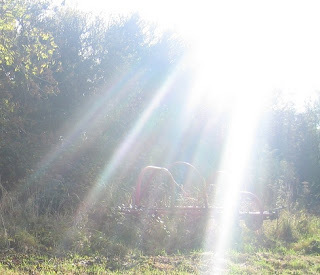 The hottest year on record? We don't knowScientists have to be precise. It is their downfall when they try to communicate. The media don't want precision, 'if's and 'but's and error bars. They want black and white 'facts'. It's not a trivial problem. If, as a scientist, you over-simplify then you are in danger of getting a twisted message across (and losing the respect of your peers). If, on the other hand, you apply normal scientific caution people switch off and your political opponents rip you to pieces.
The hottest year on record? We don't knowScientists have to be precise. It is their downfall when they try to communicate. The media don't want precision, 'if's and 'but's and error bars. They want black and white 'facts'. It's not a trivial problem. If, as a scientist, you over-simplify then you are in danger of getting a twisted message across (and losing the respect of your peers). If, on the other hand, you apply normal scientific caution people switch off and your political opponents rip you to pieces.This is a problem that climate scientists face all the time. Every time they revise something or hedge their statements with probabilities, or admit there are competing theories, those with a vested interest in playing down climate change wade in and give it to them with all guns blazing. And it wouldn't surprise me if this happens again with the recent announcement that they've changed their mind about what was the warmest year on record. 'If they can't even decide this,' the professional sceptics will crow, 'how can they possibly say what the climate will be like in 50 years time?'
The trouble is, deciding on the warmest year is not a trivial task. It is all very well to ask how the average temperature on the Earth is varying – but how do you find out the average temperature of such a huge body, with such varied weather at any one time? It isn't actually possible to calculate a meaningful average for the whole world. Apart from anything else, there isn't a good enough spread of weather stations evenly across the Earth's surface to achieve this.
Instead, what they do is make use of 'temperature anomalies.' These compare the average temperature for the required year against long term averages using the same weather stations. That way you get a like-for-like comparison and can understand the way temperature is changing without knowing the 'real' average temperature across the world.
The trouble with this approach, producing those disputes over what is the hottest year since records began, is that the chosen year will vary depending on the spread of years you use for your long term average. Hence the fact we used to think the hottest year on record was 1998, but now it is 2010. So when the anti-climate change brigade leap on this, bear in mind it isn't a mistake, it's merely refining the data. It doesn't actually matter how you cut it - the different averaging processes all say that the decade up to 2010 was the hottest since records began. But it's fairly easy to fiddle around with the specific hottest year.
Not error, just the true scientific process. As I've said many times before, science isn't about 'true and unchanging facts' - dogma should be for religion, not science - it is about our best understanding given the data we have at the moment and will always be provisional and open to change in the future.
Published on March 20, 2012 09:08
March 19, 2012
Forget the two car family - now we have the two broadband family
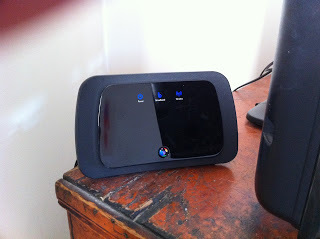 Sneaky new router hiding behind the TVIt's several weeks since we acquired our Apple TV box and it is getting very heavy usage. The quality of TV shows and movies from iTunes and Netflix is much better than I expected - generally indistinguishable from ordinary TV.
Sneaky new router hiding behind the TVIt's several weeks since we acquired our Apple TV box and it is getting very heavy usage. The quality of TV shows and movies from iTunes and Netflix is much better than I expected - generally indistinguishable from ordinary TV. But a problem has reared its head. Inevitably the Apple TV box takes a hefty chunk of our internet bandwidth. If one person is watching TV this way and someone else wants to download a file or watch something on YouTube, the viewing becomes pretty well impossible, with lots of pauses and hiccups.
Where we live we can't currently get ultra-high speed broadband, because there is neither cable TV nor fibre optic cabling. (I find this bizarre in a yuppy estate built less than 10 years ago, but who can fathom the minds of BT and Virgin?) But luckily there was a solution.
As it happens, we have two phone lines into the house, one for my business, one for home. Our internet has always come off the business line. So I bit the bullet and got broadband on the home phone as well. In one of those rare bits of sensible planning by the housebuilder, there is a phone socket behind the TV, so I was able to hardwire the Apple TV to the new router, while our computer-based internet use still remains on the old router. Web heaven.
As an added bonus, if I want to do two heavy things at the same time, I can always hook up on the new router's wifi - and if my business broadband goes down (which it has twice so far for at least a day each time), I have a fallback. It isn't hugely expensive either... but somehow it does feel decidedly decadent, being a two broadband family.
Published on March 19, 2012 10:31
March 16, 2012
Oh, goody. A book trailer (yawn)
I've just put a competition on the www.popularscience.co.uk home page, giving away a copy of the excellent James Gleick's new book, The Information. When it had gone live, I was asked if I could add a link to the book trailer video. I did, but with gritted teeth. I really have no time for book trailers.
In the end, a book trailer is an advert for a book. I resent spending my time watching a video for this purpose. It's probably because I'm an old curmudgeon, but I'd much rather have written words than a video. It's all a matter of scanning.
If you give me a written press release on a book, I can scan the whole thing in about 10 seconds. If there's anything interesting I can then home in and read the detail I want. Video is so low tech in this regard. It's so twentieth century and linear. You have to sit through the thing in the order the maker put it in, at the speed they produced it. I want to control the input of media in my brain with this kind of thing.
I'm not saying I would never make a book trailer. I appreciate there are plenty of people for whom video works well, and so I'd be willing to give it a go. (And I even get mild entertainment from the Amazon.de trailer for one of my German books, even though it's not great.) But don't ask me to watch one. I don't have the patience and I resent not having the control.
In case you are interested, here is Gleick's trailer. It could be a good one, but I only got 5 seconds into it and got bored. I mean, it lasts over three minutes! If you like book trailers, why not watch it and give me a precis in the comments. Is it any good?

In the end, a book trailer is an advert for a book. I resent spending my time watching a video for this purpose. It's probably because I'm an old curmudgeon, but I'd much rather have written words than a video. It's all a matter of scanning.
If you give me a written press release on a book, I can scan the whole thing in about 10 seconds. If there's anything interesting I can then home in and read the detail I want. Video is so low tech in this regard. It's so twentieth century and linear. You have to sit through the thing in the order the maker put it in, at the speed they produced it. I want to control the input of media in my brain with this kind of thing.
I'm not saying I would never make a book trailer. I appreciate there are plenty of people for whom video works well, and so I'd be willing to give it a go. (And I even get mild entertainment from the Amazon.de trailer for one of my German books, even though it's not great.) But don't ask me to watch one. I don't have the patience and I resent not having the control.
In case you are interested, here is Gleick's trailer. It could be a good one, but I only got 5 seconds into it and got bored. I mean, it lasts over three minutes! If you like book trailers, why not watch it and give me a precis in the comments. Is it any good?
Published on March 16, 2012 08:27
March 15, 2012
Service business 101: Starbucks Wars
 My recent post about Stabucks versus Costa produced a surprising level of response, I think (as I indicated at the start of that post) because of a knee-jerk reaction to Starbucks-as-corporate-behemoth. But what I found fascinating in the comments was how many people don't understand the basics of the kind of business Starbucks is in, and think that it is all about selling great coffee. It really isn't. Before I was a science writer I spent a long time in business and I hope you won't mind a quick excursion into service business 101.
My recent post about Stabucks versus Costa produced a surprising level of response, I think (as I indicated at the start of that post) because of a knee-jerk reaction to Starbucks-as-corporate-behemoth. But what I found fascinating in the comments was how many people don't understand the basics of the kind of business Starbucks is in, and think that it is all about selling great coffee. It really isn't. Before I was a science writer I spent a long time in business and I hope you won't mind a quick excursion into service business 101.Some companies - the no frills ones, typically - are pretty much about what they seem. So EasyJet is in the business of getting people from A to B. But many businesses are really about something else - the experience. British Airways, for instance, is not primarily about getting you from A to B. They can get away with charging as much as 10 times what EasyJet does for the same journey because this is the case. Of course they have to do the basics as well - but the reason a customer goes to them and not to a no frills company is because of what they provide on top.
The same is true of most clothing shops. They are not really in the business of selling clothes, or they'd all be like Primark or George at ASDA. And, perhaps most starkly of all, most coffee shops are not about the quality of their coffee.
For one thing lots of people going in these places to buy coffee. But even if they do, it will usually be a secondary aspect of the visit. If I look at occasions I've drunk coffee in Starbucks I'd say about a third were to socialize with friends and family, about a third because I had to wait to do something else and wanted somewhere to sit, wait and use the Internet and about a third when I was in a strange place and needed somewhere I could rely on to deliver some refreshment with familiarity because I hadn't time to explore and find the better local version. Pretty well never was it because I wanted a great coffee. To be honest, coffee isn't that important in my life.
What you are buying with a service business like Starbucks is primarily the experience, not the coffee. And that's where in my humble-but-at-the-same-time-I-have-written-an-excellent-book-about-customer-service-recommended-by-Harvard-Business-School opinion Starbucks does a lot better than Costa.
You might wonder about takeaway coffee. Frankly there is no good reason for paying those prices for anyone's takeaway coffee. And if you have someone who makes better takeaway coffee that is convenient I can't see why anyone would sensibly buy from Starbucks. That a lot of people do is partly a testament to the power of brands, but also reflects the fact that Starbucks has some good locations. With takeaway convenience rules.
Think about it. Drinks like tea and coffee cost pence to make. Allow a 100 percent markup to make a profit - it's still pence. All the rest of the £2.30, or whatever you spend, is for something else.
One last observation - one of my commenters dug up the old 'I would never use Starbucks because they refused to serve war veterans' line. I can strongly recommend the website snopes.com for checking out urban legends (despite their irritating pop-up advertising, the content is excellent) - and their analysis of this story makes really interesting reading. It is a fascinating insight into the way untrue rumours can spread, and in this case could even be changed from the original US soldiers to Royal Marines. But it appears the 'wouldn't serve war veterans' line is a total fabrication.
Image from Wikipedia
Published on March 15, 2012 08:11
March 14, 2012
Storm in a teacup
 The recent solar storm was a classic example of the way the impact of scientific information on our everyday lives can be misrepresented with the best of intentions (in this case to get a story noticed) but can result in more harm than good.
The recent solar storm was a classic example of the way the impact of scientific information on our everyday lives can be misrepresented with the best of intentions (in this case to get a story noticed) but can result in more harm than good. I happened to be appearing on our local BBC radio station on Saturday with the excellent Mark O'Donnell and inevitably the solar storm was a big talking point. There was much fun had with audience suggesting things that could be blamed on the storm (e.g. The crisps were all crushed in someone's packet, Swindon Town losing to Oxford) and that's not surprising as some of the coverage suggested we could expect the end of life as we know it, where in practice no one noticed anything.
The problem is that the media is terrified of using probabilities, so tends not to paint a good picture of an event which we can only predict the impact of in statistical terms. Instead we got dire warnings of the worst possible outcome, which given the reality made the reports look like scientists were crying wolf.
Although this one was a false alarm we do have to face up to the distinct possibility that at some point we will get a repeat of the great solar storm of 1859. This caused sparks to fly from telegraph poles, gave telegraph operators electric shocks and set recording paper on fire. The aurora boreal is visible throughout the UK and as far south as Rome.
There's no doubt such a zapping would damage some of our ground-based electronics, but the biggest impact would be on satellites which could be uniformly and permanently knocked out because they have less protection from the Earth's magnetic field.
Just think - no GPS, devastated weather forecasting, loss of satellite communications for TV, telephone and Internet. We wouldn't lose all our electronic world, but it would be severely restricted for at least a decade before satellite capability could be restored.
Oh and no Sky TV. Not all bad, then. (Sorry, Sky, you'd be missed really, I'm sure. I just couldn't resist the tradition of Murdoch bashing.)
Image from Wikipedia
Published on March 14, 2012 08:09
March 13, 2012
Exploring the Universe
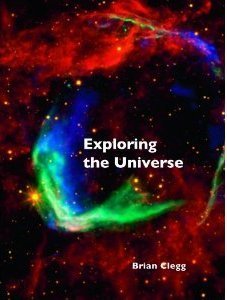 Apologies to anyone who thinks my books are turning up rather too thick and fast this year - but I've got another one out! (It will be a bumper year: there are three more due out in the next six months.) On the other hand, it's very different from anything else I've done.
Apologies to anyone who thinks my books are turning up rather too thick and fast this year - but I've got another one out! (It will be a bumper year: there are three more due out in the next six months.) On the other hand, it's very different from anything else I've done.Exploring the Universe is a book of striking photographs in an exploration of astronomy and cosmology. It's a sort of manageable coffee table book - big enough for the photos to be impressive, but small enough to be able to read with your wrists falling off.
That reading part is important because although the pictures (around 100 of them) are a significant component of this book it was really important for me that the text was both readable and had plenty to say. I think a real danger with this kind of book is that they can be just a collection of pictures with some hastily assembled text. In this case I've tried to make sure that the text packs in plenty of fascinating information.
So, for example, while I hugely recommend the iPad Solar System app which inevitably is driven by the graphics, the book version of it was a bit of a let down, because the text is too bitty. In my tour through the universe, the text came first - and it flows through the book, rather than being a set of tiny standalone articles.
I ought to explain one thing - the title. It might sound like a book on space exploration, but I wanted to make the point that our main vehicle for exploring the universe is light, not spacecraft. Going out and experiencing things close up is never going to be an option for most of the universe. We have to rely on light in all its forms to enable us to find our way around our remarkable universal environment.
Take a look at the book's web page to find out more or buy a copy.
Published on March 13, 2012 08:20
March 12, 2012
Starbucks versus Costa
 I know some people think that Starbucks are on the same axis of corporate evil as McDonalds and Microsoft, but quite like them. I've recently had the opportunity to do a bit of a head to head comparison with their main UK competitor, Costa Coffee - and I'm afraid, Costa, for me Starbucks is well ahead.
I know some people think that Starbucks are on the same axis of corporate evil as McDonalds and Microsoft, but quite like them. I've recently had the opportunity to do a bit of a head to head comparison with their main UK competitor, Costa Coffee - and I'm afraid, Costa, for me Starbucks is well ahead.It's interesting that last year Costa ran a 'we asked people to compare and 4 out 5 (or some such number) preferred our coffee to you know who.' This is falling for the dreadful Pepsi marketing error. Many years ago, Pepsi did taste tests and 'proved' that a lot of Coke drinkers prefered the taste of Pepsi. Pepsi entirely missed the point. People don't sit down, compare two colas on taste and buy the one they like better. When they buy Coca Cola, they buy the package - and when it comes to the whole ethos, Pepsi comes second best.
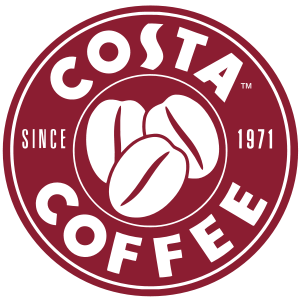
Similarly, it wouldn't really matter if Costa's coffees do taste a little better. Because that's not an issue. Starbucks coffee tastes fine. (I'm sorry coffee snobs, it does.) But the whole experience of going and having a coffee at a Starbucks is significantly nicer. Some key points to take note of, Costa:
Starbucks premises have a lighter look and feel. Costa has dark wood to Starbucks' light wood. Result - you feel depressed the minute you walk in a Costa shop.The staff are better in Starbucks. I'm sorry, I don't know why, but they are. (It would be interesting to compare pay, but I don't know if that's the reason.) Starbucks staff are pretty well always cheerful and friendly. Costa grudgingly serve you. What's more, almost every Costa I've ever been in, all or almost all of the staff had English as a foreign language. This just doesn't help when you ask for anything that isn't straight off the menu board. It's a pain.The design of the counter is better in Starbucks. Practically every Costa I've been in has the serving bar too close to the till. So you end up with the queue to collect drinks running back into the queue for the till. Messy.The loyalty card system is better at Starbucks. With Starbucks I have an iPhone app that not only keeps track of my reward information, I can even use it to pay for my drinks. At Costa I have to manually enter the LONG card number into the website to check my points.The fun extras are better at Starbucks. I love the little card you get every week that has some iTunes giveaway like a book or music. Costa may do something, but I haven't seen it yet.All in all - no contest. Get your act together Costa. It's not all about the coffee. Actually it's not mostly about the coffee. Coffee is cheap. We pay around £2 of that £2.30 not for the coffee but for the experience. Don't take this as a put down, take it as cheap consultancy. I'd normally charge several thousand pounds (and please do get in touch at brian@brianclegg.net if you'd like more detailed help). But you can have this for free.
Image from Wikipedia
Published on March 12, 2012 08:26



